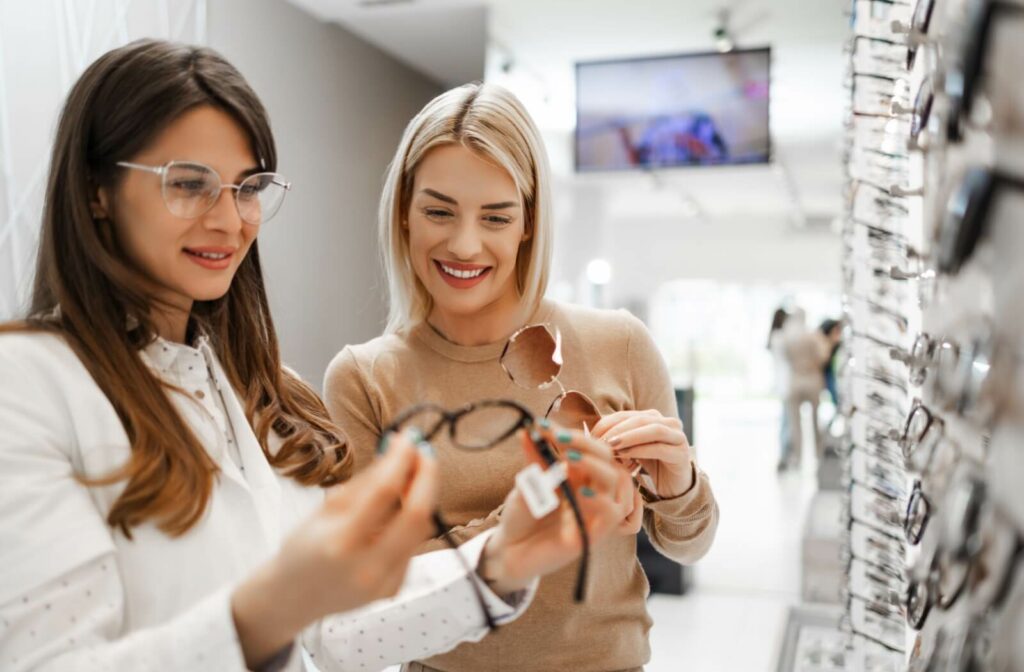You’ve probably heard it before—someone claims that wearing glasses will make your eyes lazy or dependent. It’s a common belief, but let’s set the record straight: no, wearing glasses doesn’t make your eyes worse. That’s just a persistent myth that refuses to fade. Glasses don’t weaken your eyes. They’re simply a tool to correct your vision and make your world clearer.
If your eyesight changes over time, it’s likely due to natural factors like aging or underlying eye conditions, not because you’ve been rocking your specs too much.
Think of glasses as your vision’s sidekick—they’re here to help, not hurt. But if you feel like your prescription isn’t doing the trick anymore or you’re squinting more often than usual, it might be time for an eye exam. Staying on top of your eye health ensures your glasses are doing their job and keeps those myths in check.
Plus, visiting your optometrist is a great way to learn more about what’s happening behind the scenes with your vision.
Do Glasses Affect Your Vision Over Time?
The short answer? No, wearing glasses doesn’t make your vision worse. But many people experience changes in vision while using glasses and assume the lenses are to blame. The reality is more complex and less alarming.
Vision typically worsens (or changes) as part of the natural aging process or due to eye conditions like:
- Nearsightedness
- Farsightedness
- Astigmatism
Glasses aren’t causing these changes, they’re simply correcting the way light focuses onto your retina so you can see more clearly. To understand why glasses aren’t the villain, it helps to know how they work.
How Glasses Work to Correct Vision
Think of glasses as problem solvers for your eyeballs. If your vision is blurry, it’s often because light isn’t focusing properly on the retina (the part of your eye that processes visual information.)
- Nearsightedness (Myopia): Light focuses in front of the retina, making distant objects blurry. Glasses with concave lenses shift the focus back onto the retina.
- Farsightedness (Hyperopia): Light focuses behind the retina, making close-up objects fuzzy. Convex lenses correct vision by moving the focus forward.
- Astigmatism: This occurs when your cornea is irregularly shaped. Glasses provide correction that balances the uneven focus.
These lenses don’t heal the underlying issue, but they correct the way your eyes focus, helping you see the world.
The Truth About Glasses & Eye Dependency

Another common worry is that wearing glasses makes your eyes “lazy” or “dependent” on them, as though your eyes will stop functioning on their own. This isn’t true.
Your glasses aren’t “training” your eyes to need them more. Instead, they’re a tool for providing optimal vision. When you take them off, you’re simply seeing the world through the same lens as before, no better or worse.
If your prescription changes over time, it’s usually due to changes in your eyes that would’ve happened regardless of whether you wore glasses or not.
What Causes Vision Changes If It’s Not Glasses?
Vision changes happen for various reasons, none of which are related to the glasses you wear. Common causes include:
- Aging: Presbyopia, often starting in your 40s, makes it harder to see things up close.
- Screen time: Extended use of phones, tablets, or computers may lead to eye strain, but it doesn’t permanently harm your eyes.
- Eye conditions: Issues such as myopia progression or cataracts can naturally develop over time.
- Health-related factors: Certain health conditions, such as diabetes, can impact your vision.
Managing Vision Changes
Routine eye exams play a critical role in keeping your vision in check. Even if your current prescription works well, regular visits offer several benefits, including:
- Detecting any early signs of eye conditions or diseases.
- Ensuring your prescription remains suited to your needs.
- Offering guidance on how to protect your eyesight long-term.
For most adults, a comprehensive eye exam every year is ideal, but consult your optometrist to determine what’s best for you.
How to Maintain Healthy Vision While Wearing Glasses
Wearing glasses is only one part of maintaining clear vision. Here are a few tips to keep your eyes feeling great and working well.
- Reduce screen strain: Follow the 20-20-20 rule. Every 20 minutes, look at something 20 feet away for 20 seconds.
- Stay UV safe: If you wear glasses, consider lenses with UV protection or invest in quality sunglasses.
- Eat for eye health: Foods rich in omega-3 fatty acids, vitamins A, C, and E, and zinc support eye health. Think spinach, salmon, and carrots.
- Rest your eyes: Make sure to get enough sleep and avoid overworking your eyes.
Finding the Right Glasses for Your Needs
Not all glasses are created equal. From lens types and coatings to frame styles that flatter your face, choosing the right pair can make a world of difference. Your optometrist is your best ally in finding glasses that suit your vision needs and daily routine.
If you’re feeling unsure about your eyesight or simply need help picking your next pair of glasses, book an appointment with Vision Care Grayslake.





